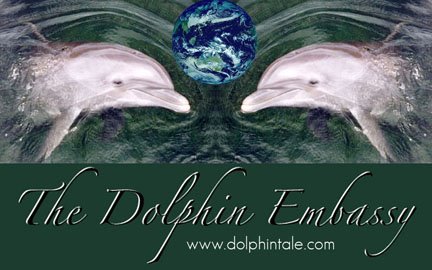
Over the years my work has taken many forms. Chapters in my efforts to bring humans and dolphins closer together have spanned areas such as:
- Dolphin-Assisted Therapy research and program development and running a program for three years (Dolphin EDventures Wellness Programs)
- writing a major book (“Souls in the Sea: Dolphins, Whales, and Human Destiny”, published by Frog Ltd., Berkeley, CA, 2003)
- writing and producing a TV series (“The Dolphin People”)
- writing screenplays and TV series treatments
- producing and presenting thousands of lectures around the world
- leading journeys to dolphin sites (Mexico, Bahamas, Hawaii, Florida, Australia)
- tirelessly advocating the recognition of the Cetacean Nation
- researching, developing, and sharing the Legend of the Golden Dolphin with many thousands of people
- exploring the philosophical, psychological, and metaphysical dimensions of the human-dolphin connection
- exploring the mythological and traditional indigenous people’s wisdom regarding this ancient connection
and many more areas. My work has spanned 26 years now and continues, as my dedication remains unabated.
My latest efforts to find a location for a re-established Dolphin EDventures Wellness Program have, so far, not yielded a suitable location. I remain hopeful a facility with an enlightened management will be found, where we can demonstrate the four-way success that is possible – for the facility, for the guests, for us, and most especially for the dolphins.
At present my plans have taken yet another direction, one that I have always known was coming: a return to the Academic world, in pursuit of a Doctorate.
I have seen many inroads over the last ten years, advances (if this word can be used here -- smile) against work done by many dedicated people, making the human-dolphin connection stronger and more available, work that we feel has been so important. Science has been accumulating evidence of the dangers of some interactions, for both humans and dolphins. Science has attempted to show how the lives of dolphins can be, and have been, negatively impacted by human contact.
While some of what has been published along this line has been well-founded, and proposals to do more to protect dolphins from foolish actions by humans, or dangerous environmental activities, are certainly welcome and necessary, I have seen another kind of reporting that is questionable. Since science is the basis for most governmental decisions regarding the management of the human-dolphin connection, it is science that must be addressed first if we want to be sure that rules, laws and the legislation that creates these are wise and helpful.
In my many years of work in the field, we have seen some good come from proper management. The heavy penalties for “cowboy roundups’ of dolphins so that people can see them more easily, or swim with them in the wild, have effectively put a stop to most of this dangerous behaviour. In places where contact occurs that have instituted good education programs for the public, improved safety for both humans and dolphins has been the result.
I have also seen some poor management practices. While well-intentioned, they have been unnecessarily intrusive, restricting safe, knowledgeable, and mutually beneficial interactions in some cases. Wild encounters, compassionate interactions during strandings, and even Dolphin-Assisted Therapy have been strongly – negatively -- affected by poorly informed laws based on science that has not been adequate.
To this end, I have decided to focus on an area of science that holds promise for bringing more comprehensive and more compassionate understanding into the field. Recent advances in both philosophical and sociological studies have opened up a new field that I feel has exciting promise for our purposes: Animal Geography.
Animal Geography studies how humans and animals share space. In my case, I intend to advance our understanding of how the dolphin encounter affects the human family, the role of the choices that dolphins make, and how these can be seen from new viewpoints.
I believe that I have found strong theoretical and biological frameworks for establishment of the person-hood of dolphins, and even further, that there is a very strong argument to be made that dolphins do exercise intelligent and informed choices, and that we must recognise the rights of dolphins to make their own decisions, especially regarding interaction with humans.
Exploring possibilities, I have found that the University of the Sunshine Coast is willing to allow me to undertake a year of Honours study, producing a 25,000 word dissertation by early November of 2009 (working title of the dissertation: “The Dolphin-Human encounter: Embassy or Zoo-without-walls?”). Despite not having a Bachelor’s degree, alternative entry has enabled him to enter the University at a level commensurate with his abilities.
Following the Honours year, assuming the dissertation is well-received, I will then enter the PhD program, aiming at a Doctorate of Philosophy.
With a PhD (which I currently intend to be based upon an examination of how Dolphin-Assisted Therapy is understood by the public, by science, by the therapeutic community, and by the patients and their families) I feel I can effectively address the scientific and academic community’s concerns, hopefully redirecting thereby some of the misguided rules, laws, and opinions that have begun to impinge on the human-dolphin connection.
Wish me luck, I have a lot of work ahead. University classes start in just over a week…
Regards,
Scott
Ambassador

No comments:
Post a Comment